Table of Contents
Get started with MyPerfectResume today!
- Build a resume on any device
- Pick an ATS-friendly template
- Tailor with AI copy suggestions
Why this resume works
- Quantifies accomplishments: Measurable accomplishments, such as reducing errors by 20% and conducting over 2,000 tests monthly, highlight the applicant’s impact.
- Showcases career progression: The trajectory from laboratory technician to medical laboratory technologist showcases increasing responsibility through roles that emphasize both leadership and technical expertise.
- Illustrates problem-solving ability: Implementing a protocol that cut test turnaround time by 30% exemplifies their innovative approach and problem-solving skills in fast-paced environments.
More Medical Laboratory Technologist Resume Examples
Explore our medical laboratory technologist resume examples to learn how to highlight your lab skills, technical knowledge, and hands-on experience. These medical resume samples will help you create a strong resume that stands out to employers.
Entry-Level Medical Laboratory Technologist
Why this resume works
- Centers on academic background: The education section emphasizes academic accomplishments, such as a master’s degree in medical laboratory science, showcasing a strong foundation for early-career scientific expertise.
- Effective use of keywords: By incorporating role-specific terms like HIPAA, CLIA, and diagnostic accuracy, the applicant ensures alignment with keywords that resonate with laboratory science employers.
- Shows digital literacy: Experience integrating regulatory systems and refining lab workflows reflects modern workplace readiness and computer skills essential for technical precision.
Mid-Level Medical Laboratory Technologist
Why this resume works
- Points to measurable outcomes: By detailing achievements like boosting lab efficiency by 30% and reducing errors by 40%, the applicant clearly illustrates a track record of powerful contributions and success in their field.
- Demonstrates language abilities: Language skills in Spanish, French, and German enrich cross-cultural communication in diverse settings.
- Displays technical expertise: Highlighting advanced skills such as molecular diagnostics and quality control analysis shows the applicant’s technical prowess, essential for excelling in laboratory environments.
Experienced Medical Laboratory Technologist
Why this resume works
- Lists relevant certifications: By listing certifications like Certified Medical Laboratory Technologist, the applicant showcases expertise and dedication to ongoing learning.
- Showcases impressive accomplishments: Leading major research studies and optimizing lab productivity by 30% demonstrate the applicant’s significant impact in clinical settings.
- Emphasizes leadership skills: Training interns and managing inventory reflect the applicant’s strong leadership skills, essential for coordinating efficient laboratory operations.
Medical Laboratory Technologist Resume Template (Text Version)
Jane Jones
Tacoma, WA 98411
(555)555-5555
Jane.Jones@example.com
Professional Summary
Skilled Medical Laboratory Technologist with proven expertise in conducting high-volume diagnostic tests and implementing laboratory efficiencies. Adept at quality control, reducing errors, and optimizing lab operations to enhance patient care.
Work History
Medical Laboratory Technologist
Evergreen Diagnostic Labs – Tacoma, WA
April 2023 – August 2025
- Conducted 2,000+ diagnostic tests monthly
- Increased testing efficiency by 15% in 6 months
- Ensured 98% accuracy in laboratory results
Clinical Lab Technician
Northwest Medical Center – Spokane, WA
February 2022 – March 2023
- Reduced errors by 20% by improving protocols
- Assisted in processing over 500 samples weekly
- Implemented new quality control measures
Laboratory Technician
Pine Health Labs – Tacoma, WA
February 2021 – January 2022
- Optimized equipment usage, saving $10,000 annually
- Managed lab inventory, preventing stockouts
- Trained 5 new lab assistants
Skills
- Clinical research
- Laboratory testing
- Quality control
- Data analysis
- Specimen processing
- Microscopy
- Equipment maintenance
- Health and safety protocols
Certifications
- ASCP Certified Technologist – American Society for Clinical Pathology
- Clinical Laboratory Scientist – National Credentialing Agency
Education
Master of Science Medical Laboratory Science
University of Washington Seattle, WA
June 2020
Bachelor of Science Biology
Washington State University Pullman, WA
June 2018
Languages
- Spanish – Beginner (A1)
- French – Intermediate (B1)
- Mandarin – Beginner (A1)
Related Resume Guides
- Clinical Documentation Improvement Specialist
- Clinical Project Manager
- Clinical Research Assistant
- Clinical Trial Associate
- Coding Specialist
- Dermatologist
- Dialysis Technician
- Doctor
- Electrocardiograph Technician
- Emergency Department Technician
- Emergency Room Registration Clerk
- Equipment Technician
- Health Information Technician
- Hospital Administrator
- Hospital Volunteer
- Intake Coordinator
- Intensive Care Physician
- Medical Records Specialist
- Medical Representative
- Medical Research Assistant
- Midwife
- MRI Technologist
- Neurosurgeon
- Nuclear Medicine Technologist
- OB-GYN Medical Assistant
- Ophthalmologist
- Ophthalmology Assistant
- Optometrist
- Orthopedic Surgeon
- Pediatric Assistant
- Pediatrician
- Physician
- Physician Assistant
- Podiatrist
- Psychiatrist
- Radiologist
- Radiology Technician
- Resident Medical Officer
- Respiratory Therapist
- Speech Language Pathologist
- Surgeon
- Surgery Scheduler
- Ultrasound Technician
Advice for Writing Your Medical Laboratory Technologist Resume
Discover our tips on how to write a resume tailored for a medical laboratory technologist role. Learn how to highlight your lab skills, attention to detail, and dedication to patient care in a way that stands out.
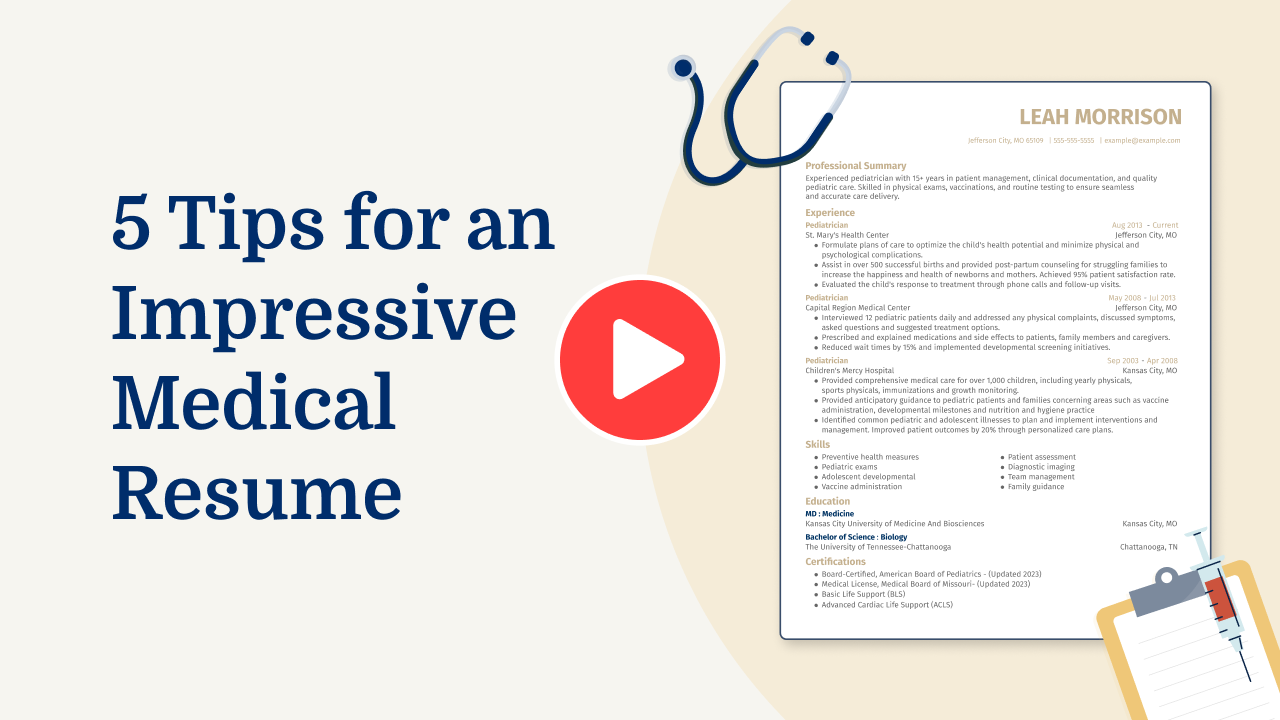
Highlight relevant technical skills
For a medical laboratory technologist, having strong technical skills is very important. These abilities ensure accurate results and smooth operation of lab equipment.
You can create a dedicated skills section or incorporate them into your work experience descriptions to make it easy for employers to see your expertise at a glance. Commonly sought-after skills for this role include using automated analyzers, performing blood tests, and preparing tissue samples. It’s beneficial to mention experience with microscopes, spectrophotometers, and centrifuges.
Additionally, being familiar with lab information systems and quality control procedures adds value. When describing your work experience, integrate these technical skills by explaining how you used them in past roles.
For instance, describe how you operated specific machines to run tests or ensured accuracy in sample analysis. This demonstrates not only that you have the skills but also that you know how to apply them effectively in real-world settings.
Example of a technical skills section
- Laboratory information management systems (LIMS)
- Blood chemistry analyzers
- Hematology analyzers
- Microscopy techniques & specimen analysis
- Polymerase chain reaction (PCR) technology
- Immunoassay procedures
- Quality control & assurance protocols
- Biochemical testing methods
- Centrifugation & pipetting techniques
- Clinical microbiology & serology
You can use our Resume Builder to craft a resume that highlights technical skills in addition to key soft skills like teamwork, communication, and adaptability.
Quantify your accomplishments
Quantifying your accomplishments as a medical laboratory technologist makes your resume more compelling than simply listing job responsibilities.
When you show measurable results like percentages, time savings, cost reductions, or efficiency improvements, it helps hiring managers quickly see the impact of your work. For example, instead of saying you performed lab tests, you could say you increased lab test accuracy by 15% through new quality control measures. This turns duties into achievements and highlights your contributions.
In the work experience section, each entry should include your job title, employer name, location, and employment dates. Using action verbs and metrics creates a results-driven resume that stands out.
For instance, “Reduced test processing time by 20% through optimizing workflow” is much stronger than stating you handled lab tests. By quantifying what you’ve done in each role, you’re showing potential employers exactly how you’ve made a difference.
Quantified accomplishments help hiring managers assess your skills quickly and effectively. They can see at a glance what kind of worker you are and the benefits you could bring to their team. Remember to turn duties into achievements with clear numbers and strong action verbs to create a powerful resume.
5 medical laboratory technologist work history bullet points
- Performed diagnostic tests on patient samples, processing over 200 specimens weekly to ensure timely and accurate results.
- Introduced a new quality control protocol that decreased sample rejection rates by 15% within six months.
- Trained and mentored 3 junior lab technicians, improving team performance and reducing training time by 25%.
- Collaborated with physicians to interpret test data, contributing to improved treatment plans for over 50 patients monthly.
- Implemented inventory management practices that reduced reagent waste by 20% while maintaining consistent laboratory operations.
Get inspired by checking out professional resume examples. They can help you find the right words and ideas to make your own resume shine.
Write a powerful professional summary
A professional summary on a resume introduces hiring managers to your key skills and experience right from the start. It makes a strong first impression, showing why you’re the best fit for the role. When crafting your resume, you can decide between including a summary or an objective.
This type of summary typically consists of three to four sentences highlighting your experience, skills, and achievements. It’s ideal for applicants with some work history in their field, such as medical laboratory technologists who have worked in clinical settings or research labs. The goal is to showcase your professional identity and demonstrate the value you bring to potential employers.
In contrast, resume objectives focus on career goals and suit entry-level applicants or those changing careers better. Objectives emphasize what you aim to contribute rather than past accomplishments—ideal for someone new to being a medical laboratory technologist. Next, we’ll explore examples of both summaries and objectives tailored for various industries and experience levels.
Medical laboratory technologist resume summary examples
Entry-level
Recent graduate with a Bachelor of Science in Medical Laboratory Technology from an NAACLS-accredited program. Possesses foundational skills in laboratory techniques, including hematology and microbiology. Certified as a Medical Laboratory Technologist (MLT) by ASCP, with hands-on experience gained through clinical rotations. Eager to contribute analytical skills and attention to detail in a dynamic lab environment.
Mid-career
Medical laboratory technologist with over seven years of experience in high-volume hospital laboratories. Proficient in performing complex diagnostic tests across chemistry, hematology, and immunology departments. Known for implementing process improvements that reduced turnaround times by 15%. Holds ASCP certification and actively participates in continuing education to stay current with industry advancements.
Experienced
Seasoned medical laboratory technologist specializing in molecular diagnostics and quality control management. Over 15 years of experience leading teams to improve laboratory efficiency and accuracy. Expert in developing training programs for junior technologists and ensuring compliance with CLIA regulations. Proven track record of improving testing protocols to achieve a 20% increase in reliability and precision.
Medical laboratory technologist resume objective examples
Entry-level
Detail-oriented and enthusiastic recent graduate with a Bachelor of Science in Medical Laboratory Science seeking to leverage strong analytical skills and laboratory training in an entry-level medical laboratory technologist position. Committed to assisting healthcare teams by ensuring accurate and timely diagnostic test results.
Career changer
Diligent professional transitioning from a career in biological research into medical laboratory technology, bringing extensive experience with laboratory protocols and data analysis. Eager to apply scientific expertise and learn new techniques in a clinical setting to contribute effectively to patient diagnosis and care.
Recent graduate
Ambitious recent graduate aiming to start a career as a medical laboratory technologist. Equipped with comprehensive knowledge of microbiology, hematology, and chemistry tests acquired through academic coursework and internships. Excited to join a team dedicated to improving patient outcomes through precise lab work.
Choose a resume template that is clean and simple, using clear sections and basic fonts. This ensures your resume is easy to read and highlights your skills without distractions.
Showcase your credentials
Listing your certifications and licenses is important for a medical laboratory technologist because it shows you have the training needed to do the job effectively. In technical fields, these credentials prove you know how to handle complex equipment and follow safety rules.
Having a dedicated certifications section on your resume helps employers see your skills quickly. It also adds value alongside your education section, showing you’re committed to keeping up with industry standards. Here are a few examples of relevant certifications for your resume:
- Medical Laboratory Technician (MLT) Certification
- Certified Medical Laboratory Scientist (MLS)
- American Society for Clinical Pathology (ASCP) Certification
- Clinical Laboratory Improvement Amendments (CLIA) Certification
- International Society for Clinical Laboratory Technology (ISCLT) Certification
These certifications help you stand out as a skilled professional ready to meet the demands of medical laboratory work. They show you can accurately perform tests and ensure patient safety. Having them listed clearly makes employers more confident in hiring you.
Example of a certifications section
Medical Laboratory Scientist (MLS) Certification
Issued by: American Society for Clinical Pathology (ASCP)
Expires 2025
Clinical Laboratory Improvement Amendments (CLIA) Certification
Issued by: Centers for Medicare & Medicaid Services (CMS)
Issued 2023
Certified Phlebotomy Technician (CPT)
Issued by: National Healthcareer Association (NHA)
Expires 2024
Specialist in Blood Banking Technology (SBB) Certification
Issued by: American Society for Clinical Pathology (ASCP)
Issued 2022
Histotechnician Certification
Issued by: American Society for Clinical Pathology (ASCP)
Expires 2026
Use a polished and professional resume format that aligns with your experience level to ensure your skills and qualifications stand out to hiring managers.
FAQ
Do I need to include a cover letter with my medical laboratory technologist resume?
Yes, including a cover letter with your medical laboratory technologist resume can improve your application and increase your chances of getting noticed.
A cover letter lets you emphasize your passion for the field, highlight specific skills like skill in lab equipment, and discuss experiences that align with the job requirements.
For instance, if the lab focuses on research or certain diagnostics, you can detail any related expertise or interest you have in those areas.
Consider using our Cover Letter Generator to craft a customized cover letter that complements your resume by providing structured guidance and content ideas.
Additionally, reviewing our selection of cover letter examples can offer inspiration and insight into effective ways to present your qualifications in this specialized role.
How long should a medical laboratory technologist’s resume be?
For a medical laboratory technologist, a one-page resume is often sufficient to highlight key qualifications like lab skills, relevant certifications, and your experience with specific testing procedures. This format works well if you’re early in your career or have focused expertise.
However, if you possess extensive experience in the field or have undertaken specialized projects, a two-page resume might be more appropriate. This allows room to detail significant achievements and advanced competencies without overwhelming the reader.
Explore our guide on how long a resume should be for examples and tips on determining the ideal length for your career stage.
How do you write a medical laboratory technologist resume with no experience?
When creating a resume with no experience for a medical laboratory technologist position, emphasize your education, skills, and any practical training you’ve completed. Here are a few tips to help you get started:
- Emphasize your education: Start with your degree in medical technology or a related field. Include details like your graduation date and any relevant coursework that aligns with laboratory work.
- Include certifications and licenses: Highlight any certifications you’ve obtained, such as ASCP certification. These demonstrate your commitment and readiness to potential employers.
- Leverage academic projects and internships: If you’ve completed any lab-based projects or internships during school, list them under experience. Detail the techniques you learned or the equipment you used.
- Showcase relevant skills: Highlight skills relevant to the role, such as skill in using lab equipment, understanding of safety protocols, attention to detail, and analytical thinking.
See our guide on writing a resume with no experience for more detailed advice on crafting a resume specifically tailored to entry-level medical laboratory technologist positions.
Rate this article
Medical Laboratory Technologist
Share this page
Additional Resources

Medical Residency CV Examples & Templates
Internal Medicine
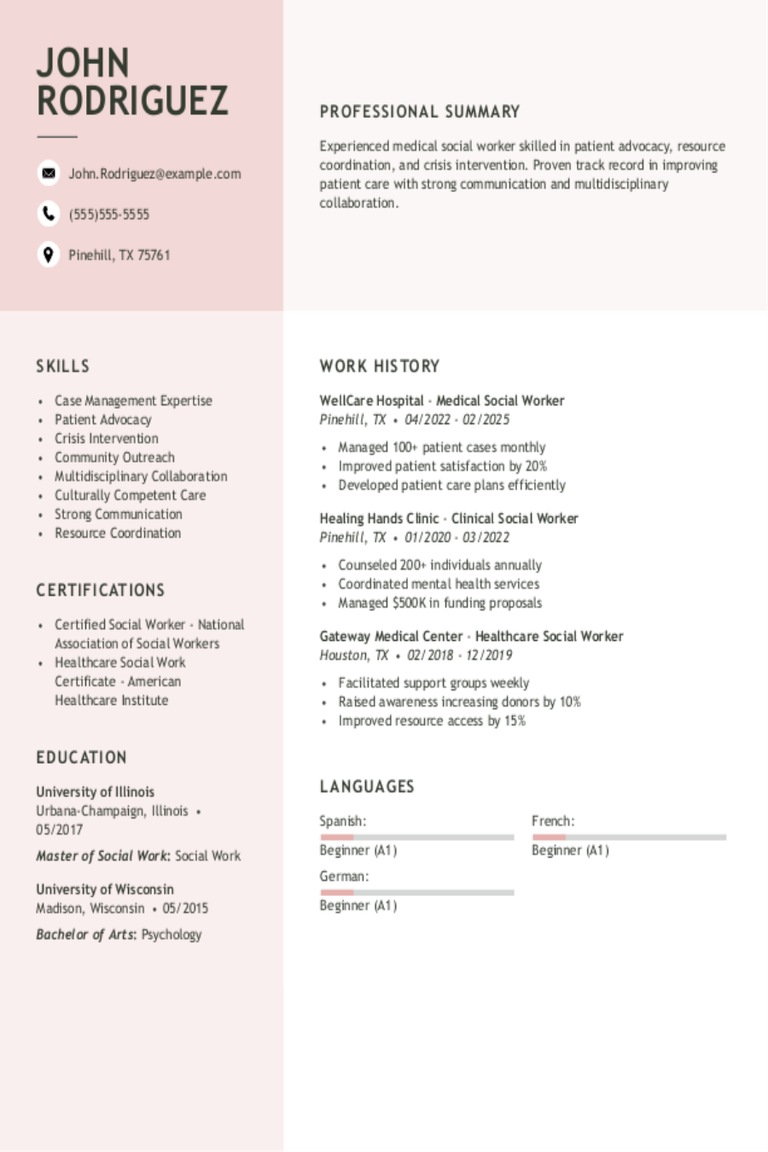
Medical Social Worker Resume Examples & Templates
Explore medical social worker resume examples and discover how to effectively showcase your experience in helping patients navigate complex medical systems and emotional challenges.Build my resumeImport existing resumeCustomize this templateWhy
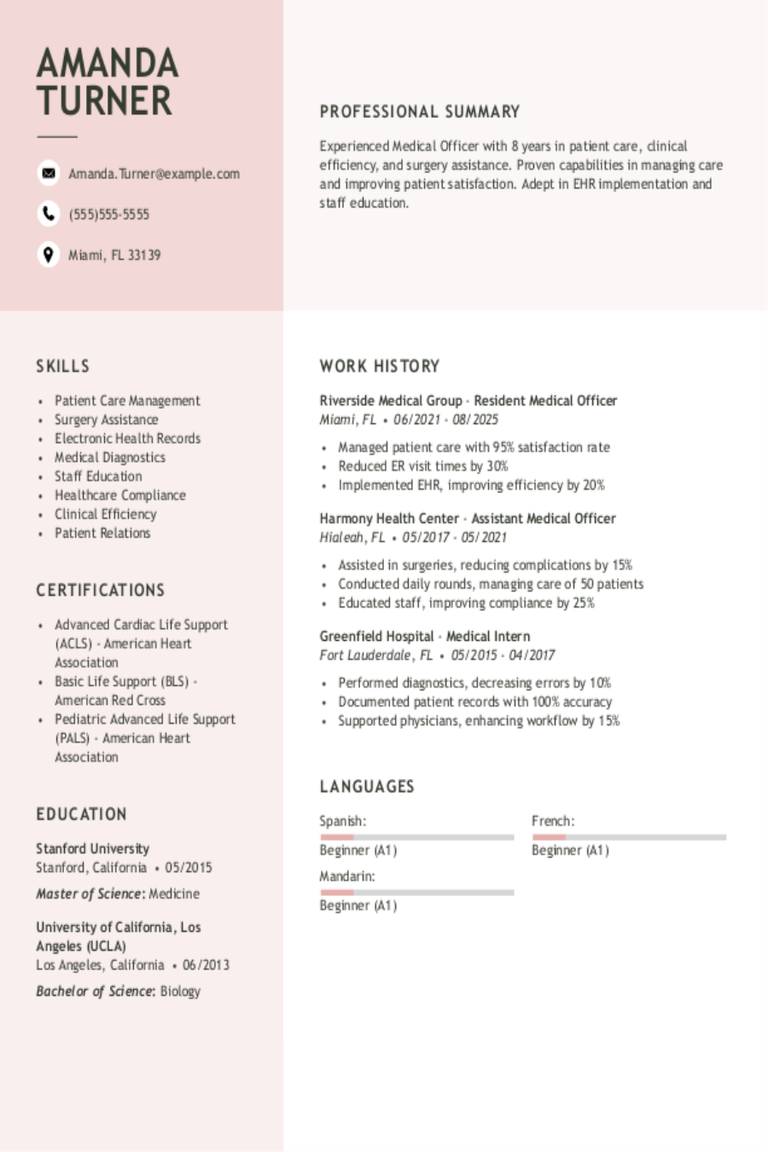
Resident Medical Officer Resume Examples & Templates
Explore resident medical officer resume examples to see how to highlight your experience caring for patients, working with doctors, and handling emergencies. These examples and tips help you showcase your
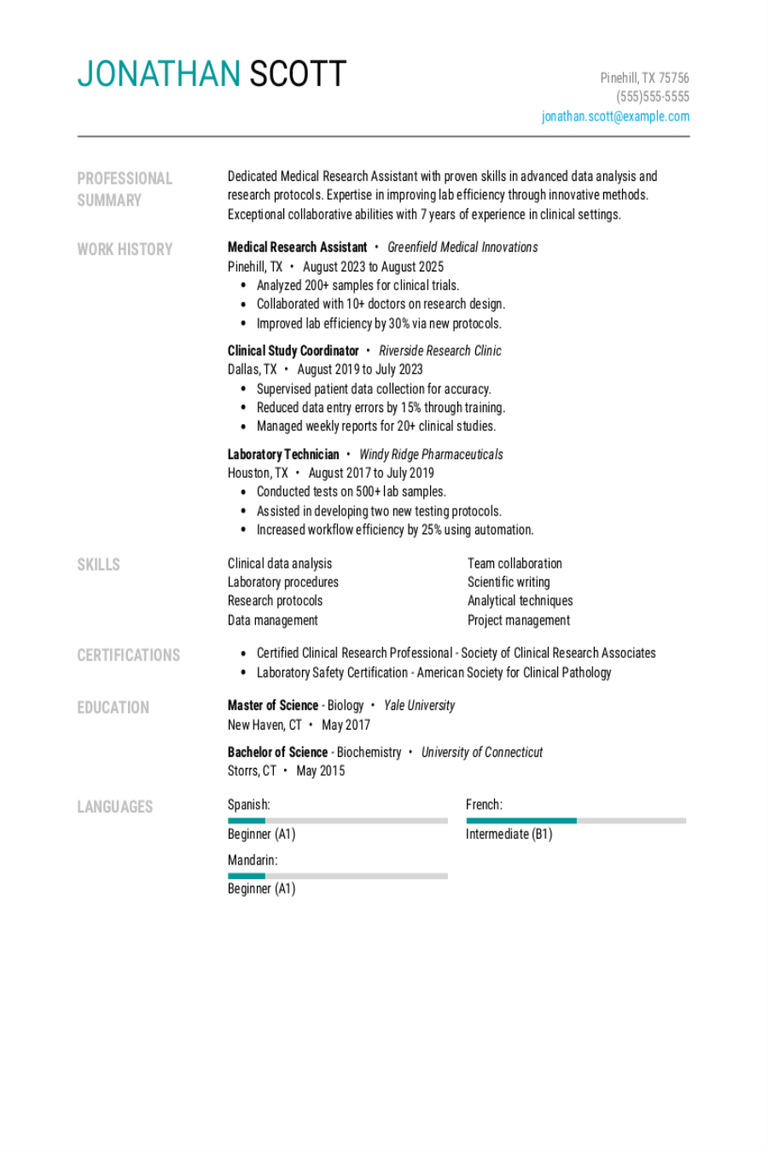
Medical Research Assistant Resume Examples & Templates
Browse medical research assistant resume examples to see how to highlight skills in helping with experiments, collecting data, and keeping labs running smoothly. These samples and tips guide you on
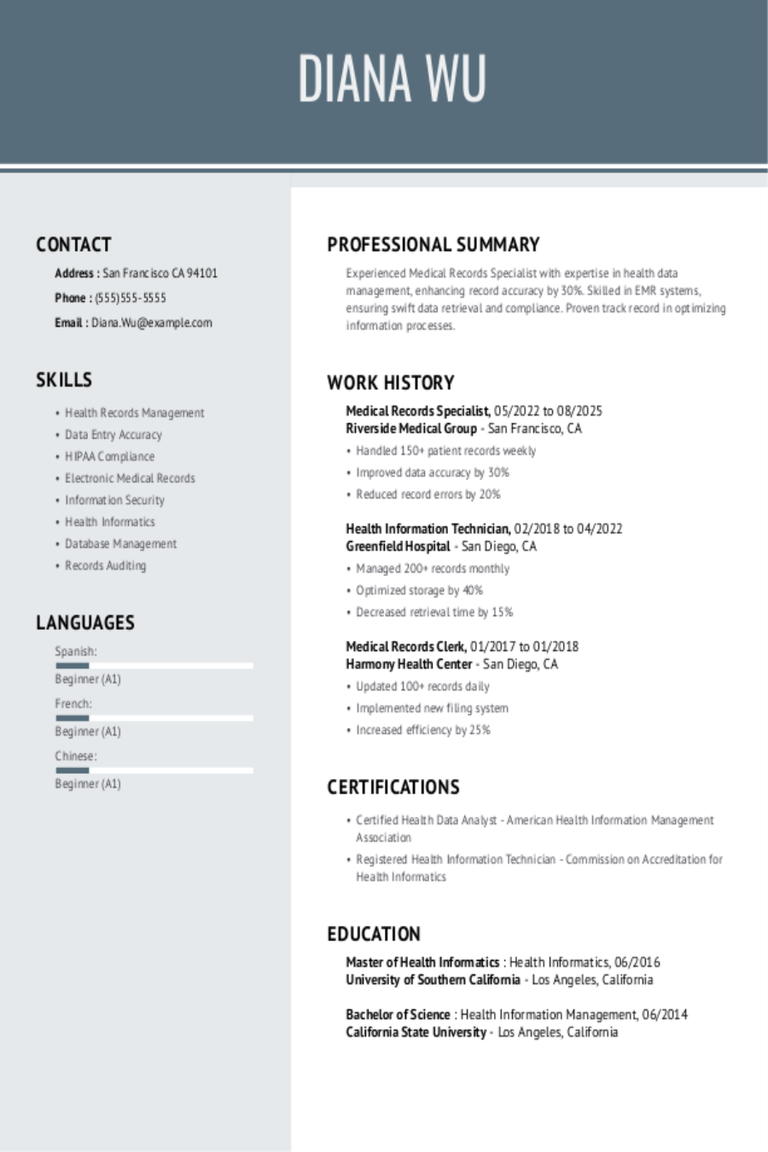
Medical Records Specialist Resume Examples & Templates
Explore medical records specialist resume examples to see how to showcase your experience organizing data, protecting patient privacy, and supporting healthcare teams. Discover tips to highlight your skills in managing
